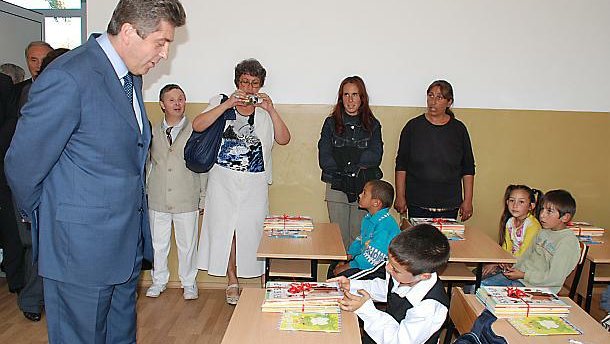
One of Bulgaria´s most painful and complex issues has to do with the Roma community and its problems, which reflect on Bulgarian society. The EU has expressed controversial opinions about France´s decision to expel the Bulgarian gypsies back to their homelands. As a result, the problem of Roma integration is back on Bulgaria´s agenda.
The last 20 years or so have seen thousands of pages written on Roma inclusion and European-funding opportunities for improving their standard of living. There are a lot of NGOs dealing with the problems of gypsies, but with no tangible results so far. Bulgaria is one of the countries that launched an international initiative entitled “Decade of Roma Inclusion 2005-2015”, jointly with Croatia, the Czech Republic, Hungary, Macedonia, Romania, Slovakia, Serbia and Montenegro. Later on, Albania, Bosnia and Herzegovina, and Spain also joined the project. The initiative focuses on the problems of Roma in the above states. Bulgaria has developed a series of strategic documents related to Roma inclusion. Yet, the latter is a long and complicated process that necessitates the mobilization of serious resources and, most of all, the Roma´s participation in it.
According to the latest census in 2001, there are some 370,000 gypsies in Bulgaria. The Roma DROM party, however, claims their number has reached 1 million. What is more, according to a 2003 UNDP report, 80% of Bulgarian gypsies define themselves as unemployed. Some 62% of them have been estimated poor, a 2001 World Bank report showed. Their participation on the labour market is poor, since most of them do not have education and qualifications and, as a matter of fact, seem unwilling to receive them. The lack of qualifications and professional experience earn little money to those on the job.
Therefore, a lot of Roma families deliberately take advantage of Bulgaria´s social care system, which, according to experts Georgi Angelov and Luchezar Bogdanov, is a major impediment to Roma inclusion. Bulgarian gypsies know all too well that receiving social benefits for giving birth to a lot of children earns much better than low-skilled labour. This is the reason why they do not pay social and health insurances. The current government is taking legislative measures to bring Roma children to schools and cut social benefits, if children are not attending them. This is one way children can stay away from the Roma ghetto´s bad habits and environment. Experts say that 32% of Roma children drop out of school because they tend to marry and become parents at an early age. There have been cases of 12-year old Roma girls becoming mothers.
The Roma inclusion requires another problem to be solved, namely the community´s living conditions. Part of the Roma lives in shacks without water, electricity and drainage systems. They tend to explain these miserable conditions with the fact they are poor, but one cannot fail to notice the satellite dishes on top of every shack. Recently, the municipality of Yambol, South Eastern Bulgaria, accommodated a number of Roma in an apartment block in the town. However, the Roma sold everything on the premises to earn money. Even after the block became dangerous to live in, and had to be demolished, the Roma were scrounging reinforcement bars of some worth to the very last moment. After the block was torn down, some 10 families found themselves next to the ruins, expecting the city council to provide new homes for them. In the meantime, residents of the nearby village signed against these gypsies settling close to their homes, for fear of thefts. In fact, over the years entire villages would complain about this issue, and because of lack of police patrol some residents would even start guarding them against Roma thieves.
Indeed, there are Roma in Bulgaria who earn their living honestly, have education and are well-received by society. One can see hard-working Roma especially in the country´s agricultural areas. Their homes are clean and tidy, and their children attend schools with the ambition to continue their education. Unfortunately, these people form a small part of the Roma community. There are still many who break the law to get by. For a lot of Roma women, prostitution is a way of living.
The above examples are only part of the Roma inclusion problem. A Radio Bulgaria reporter asked a few Bulgarians about their opinions on the issue.
“The problem with the gypsies is so old that I can’t see any solution whatsoever”, a woman said, in a hurry.
“This is a very difficult problem with no easy way to go. The state should start educating and setting requirements to these people. The laws valid for us should be valid for them, too. It will be a hard process...”, another Bulgarian woman said and added:
“I don´t approve of the Roma´s protests in front of the French embassy in Sofia. France must have expelled them, because they violated some laws. If they had been doing the things they normally do in Bulgaria, I am not surprised they would be sent back home.”
English version: Vyara Popova
On 25 January 1935, Tsar Boris III signed the decree establishing the Bulgarian National Radio. The document, which officially marked the beginning of "Radio Sofia", as the Bulgarian National Radio (BNR) was then called, made radio broadcasting in Bulgaria..
The Federation of European Carnival Cities has declared Pernik a global center of masquerade traditions. 16 years ago, Prenik was named the European Capital of Sourvakar and Mummer Traditions, and nearly 10 years ago, the Surva festival was..
Bulgaria ranks last among EU Member States in terms of life satisfaction. This is according to Eurostat data for 2023 published today . With an average level of the Community indicator of 7.3 points out of 10, Bulgaria scores 5.9. Finland tops the..

+359 2 9336 661
